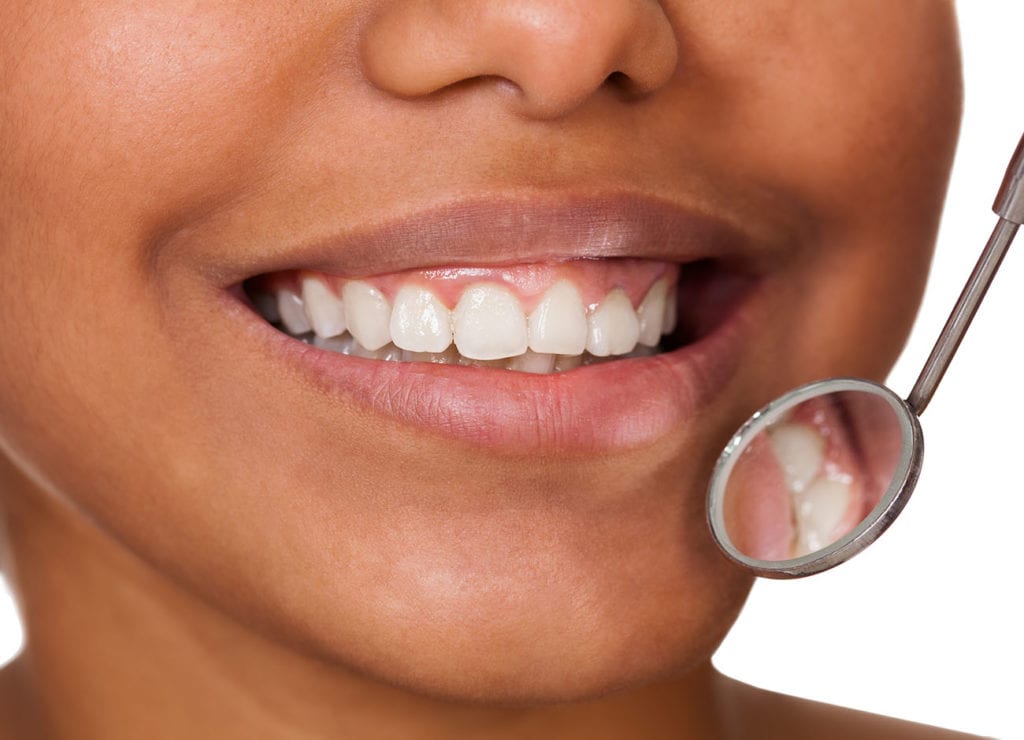Gum disease, also known as periodontitis, is a common infection that begins as gum inflammation, or gingivitis. Periodontitis is caused by a buildup of bacteria that forms plaque. If plaque is not removed, it can damage the gums. Eventually, small pockets can form and loosen the teeth.
Our office provides periodontal disease treatment as a restorative dental treatment to patients in Leland, NC. We can help reverse the damage done by gum disease and rebuild the tooth and gum structure.


Gum Disease Risk Factors and Symptoms
Patients with these conditions are more at risk of developing periodontitis:
- Smoking or using chewing tobacco
- Diabetes
- Crooked teeth
- Old dental fillings
- Pregnancy
Some of the most common symptoms of gum disease include:
- Bleeding gums
- Red, swollen, tender gums
- Gum recession
- Persistent bad breath
- Changes in the way your teeth fit together
If you are at risk of developing gum disease, or if you have noticed signs of the disease, please contact our office. Our experienced dental team is here to help.
The Stages of Gum Disease
Gingivitis
This is the earliest stage of gum disease and the only one that’s completely reversible. Symptoms of this stage are very mild, and you may not even notice them. This is why gum disease is so common and widespread. Keep an eye on your gums. If they’re bleeding frequently, this is a telltale sign of periodontal disease. Usually, this stage can be reversed with dedicated brushing and flossing, or antibacterial mouth rinses.
Early Periodontal Disease
At this point, the disease is no longer reversible. Pockets form in between your gums and the bone, collecting bacteria and food particles. Bacteria are starting to eat away at the bone, causing bone loss to start. Usually, scaling and root planing are recommended at this stage to clean out those gum pockets and smooth the tooth roots so the gums reattach.
Moderate Periodontal Disease
This is a deeper stage that’s also controlled with scaling and root planning. Bacteria bore deeper and not only attack the bone but your bloodstream too. Inflammation and bacteria from gum disease can spread throughout your body and cause problems in other areas that aren’t the mouth.
Severe Periodontal Disease
At this stage, the infection has completely evolved into disease-causing bacteria. Only surgery can help take care of gum disease at this stage. You’ll be in a lot of pain, have severe bad breath, and have gums that have pockets that ooze pus. You’re susceptible to tooth loosening or full loss and you’ll have trouble chewing and biting.
Treating Gum Disease
Our surgical and non-surgical treatments can combat plaque, gum recession, and tooth loss. During a consultation, we can examine your teeth and gums and work with you to find the best periodontal treatment for your needs.
Non-Surgical Treatment
Scaling and root planing are treatments that help reverse gingivitis. They provide a deep clean that regular toothbrushes can’t reach. Scaling cleans plaque from the teeth, gum line, and even tooth roots. Root planing smooths the tooth roots and makes it easier for the gums to reattach to teeth.
Surgical Treatment
If the tissue or bone surrounding your teeth is too damaged to be repaired with non-surgical treatment, several surgical procedures are available to prevent severe damage and restore a healthy smile.
- Pocket Depth Reduction: Also known as flap surgery, pocket reduction surgery helps combat gum recession. Gum pockets caused by receding gum tissue collect plaque and tartar which further irritates the gums. If deep gum pockets are not treated, the gum degrades to the point of tooth loss. Flap surgery removes bacteria from the gum pocket as well as damaged tissue.
- Bone and Tissue Regeneration: Severe gum disease can deteriorate the bone and tissue in the mouth. We can help patients regenerate this tissue by folding back the gum tissue and removing the bacteria, plaque, and tartar underneath. Depending on your needs, we can also perform a bone graft. Bone grafting uses bone from another part of the mouth or body to help repair the bone tissue and stimulate new bone growth.
- Soft-Tissue Grafting: Gum recession exposes the tooth roots, causing irritation and sensitivity. To perform a soft-tissue graft, we use tissue from the top of the mouth to cover the roots. This can help revitalize the gum line and prevent further recession.
Periodontal Disease FAQs
How long does periodontal disease take to heal?
Depending on the severity of your gum disease, your gums will heal in varying amounts of time. It may take anywhere from a few weeks to a few months for them to fully heal. For the first few days following periodontal treatment, we advise patients to stick to a soft diet because your mouth will be sore and swollen.
What can you not do after a deep tooth cleaning?
After a deep teeth cleaning patients should wait until any mouth numbness wears off before eating any food. If you eat while your mouth is still numb, you run a higher risk of biting your lip or tongue. Patients should also avoid drinking hot beverages as they may cause sensitivity and discomfort to gums and teeth.
Is periodontal treatment painful?
Periodontal therapy may cause minor discomfort, however it is typically much less painful than expected. We recommend communicating any anxieties about periodontal therapy with us and our office staff so that we can take preventive measures to ensure that you are as comfortable as possible during your appointment.
What problems can arise from periodontal disease?
Gum disease, also known as periodontitis, is a dangerous infection of the gums that can spread to the supporting bone structure and soft tissue if left untreated. It may ultimately result in the loss of teeth.
Can I stop periodontal disease from progressing?
You can prevent periodontal disease from progressing at any stage of the infection. The first stage is the simplest to treat, since it is the least severe. Further phases necessitate more in-depth, special care, such as scaling and root planing.
How do you prevent periodontal disease?
You can avoid periodontitis with regular brushing and flossing. Your dentist will remove plaque before it creates any issues with a regular dental hygiene routine. Doing so will ensure the long-term health of your gums and teeth.
Where does most periodontal disease begin?
Periodontitis typically develops from plaque, a thick film made of bacteria that forms over teeth. Plaque can eventually develop into periodontitis if untreated. When sugars and carbohydrates from food combine with bacteria that are naturally present in your mouth, plaque is created on your teeth. This is why it is crucial to brush your teeth at least twice daily.
What is the most common form of periodontitis?
The most prevalent and mildest type of periodontitis is gingivitis. Toxins in plaque are the root cause of this disorder, which can progress to more severe forms of periodontal disease if left untreated.
Have you noticed bleeding, irritated, or red gums? Call Waterford Family and Cosmetic Dentistry for periodontal treatment today at 910-519-1624. Schedule an appointment with our dental team online, and we will respond as soon as possible.
